Recently, politicians and pundits have finally started to acknowledge what Latinx scholars have been arguing for years: that we cannot and should not treat the Latinx community in the United States as if it were a monolith. Although there is much this pan-ethnic group shares, there is considerable variation in political values and perspectives owing to one’s geographic heritage, immigrant experience, and religious traditions (among other traits). Too often, political actors approach Latinx voters peddling one-size-fits-all policies and messaging that does not resonate with the experiences and interests of these various subgroups. Securing the support of Latinx voters requires understanding this diversity of experiences and the impact they have on political attitudes, then building a coalition within the Latinx community of those who share your political vision.
Of particular interest in this context are the important changes that have been taking place with respect to the religious composition of the Latinx community. Much has been made of the explosive growth of evangelical Christians among this historically Catholic pan-ethnicity and the tendency for the former to be more supportive of conservative candidates and social policies with respect to abortion and LGBTQ rights. Less commonly discussed is the growth of “Religious Nones” (e.g. atheists, agnostics, and the religiously unaffiliated) within the Latinx community and whether they share their non-Latinx counterparts’ propensity to exhibit stronger identification with the Democratic party and support for more progressive social policies.
Assessing the attitudinal differences between religious subsets of the Latinx community is often challenging given their relatively small proportion in most national surveys. However, both the 2018-2020 Cooperative Congressional Election Studies (CCES) and the 2022 PRRI American Values Atlas (AVA) provide sufficiently large samples to compare Latinx Catholics, Protestants, and Religious Nones on a host of important culture war issues.[1]
Beginning with partisan affiliation, Figure 1 illustrates the considerable advantage that the Democratic Party enjoys over Republicans among Latinx Catholics and Religious Nones. Of the 52% of Latinx who identify as Catholics in the AVA, the plurality (44%) describes themselves as Democrats and only 14% affiliate with the Republican Party. Similarly, compared with the Republican Party, the Democratic Party enjoys a 26-percentage-point advantage in identification among Latinx Religious Nones. Interestingly, while the partisanship of the latter is virtually identical to their non-Latinx counterparts, the same cannot be said of Catholic voters, where the Republican Party enjoys a 9-percentage-point advantage over the Democratic Party in partisan affiliation among non-Latinx. In contrast, the Republican party is far more competitive with Latinx Protestants, earning the support of 29% of this constituency compared with the 28% who align with the Democratic Party.
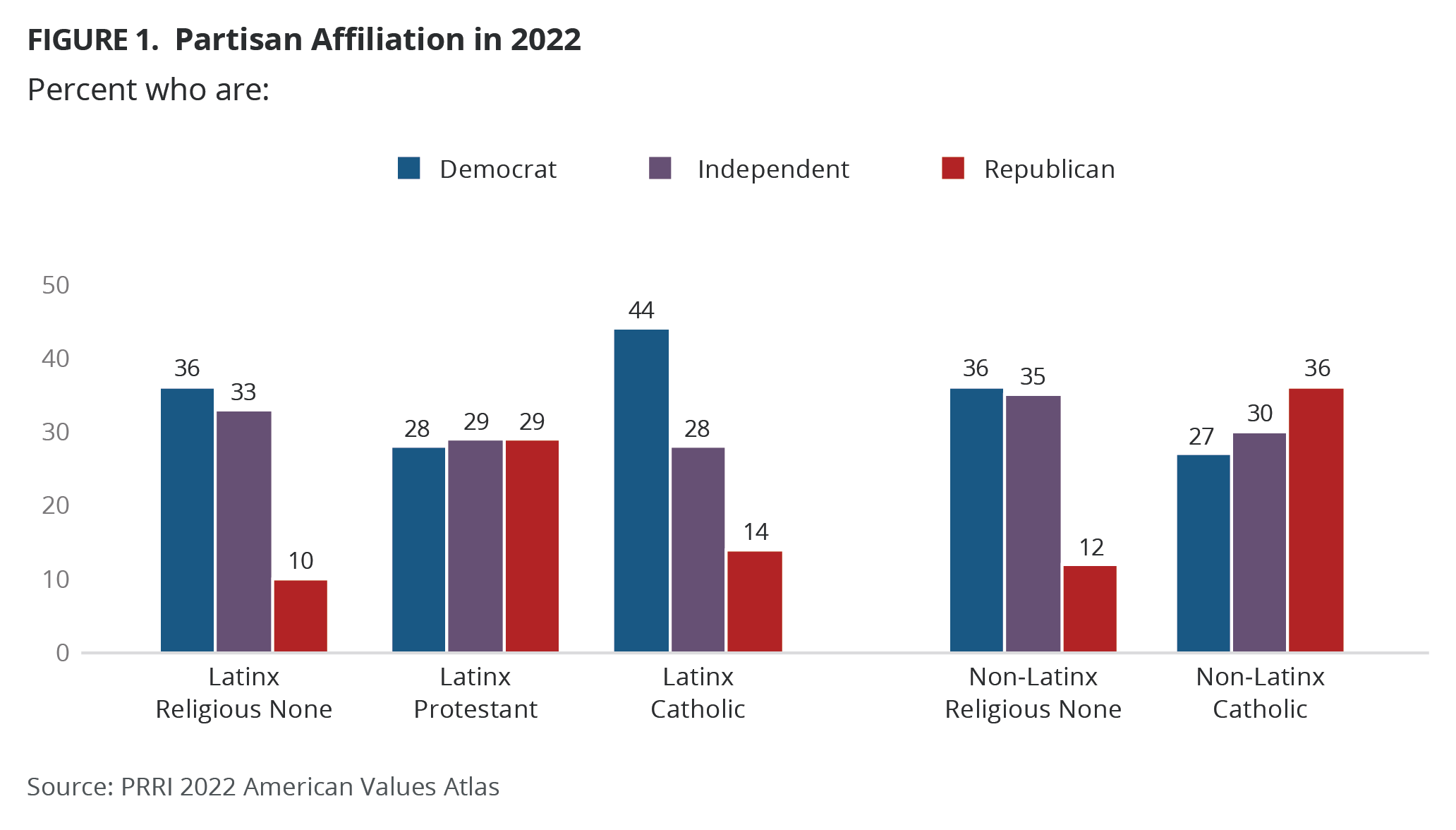
One might be tempted by the preceding discussion to assume that Latinx Catholics are more in sync with the Democratic Party’s positions on salient social policy issues compared with their non-Latinx counterparts and that no meaningful differences exist between Religious Nones. However, the 2022 AVA illustrates that the story is not that simple. The partisan gap between Latinx and non-Latinx Catholics disappears when considering support for same-sex marriage (75%/75%) and making abortion legal in all or most cases (61%/63%). Conversely, non-Latinx Religious Nones are substantively more supportive of these positions compared with their Latinx counterparts. While Democrats can take solace in the fact that the only 23% of Latinx Religious Nones oppose abortion in all or most cases and 20% oppose same-sex marriage, these figures are roughly 10% higher than is found among non-Latinx Religious Nones. Finally, while Latinx Protestant affiliation is evenly dispersed between the parties, their views on these issues are far more conservative with only 44% in favor of either abortion or same-sex marriage.
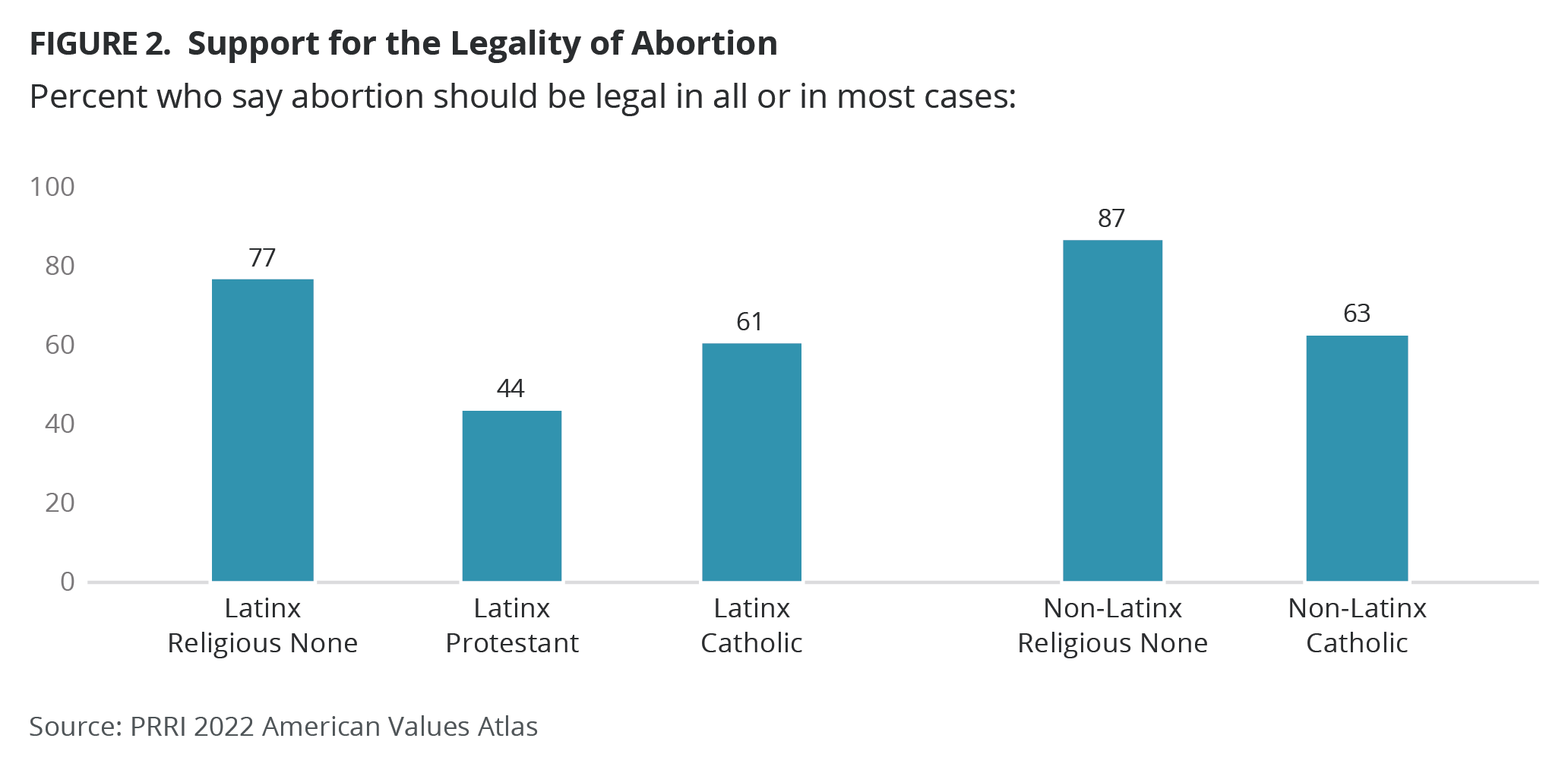
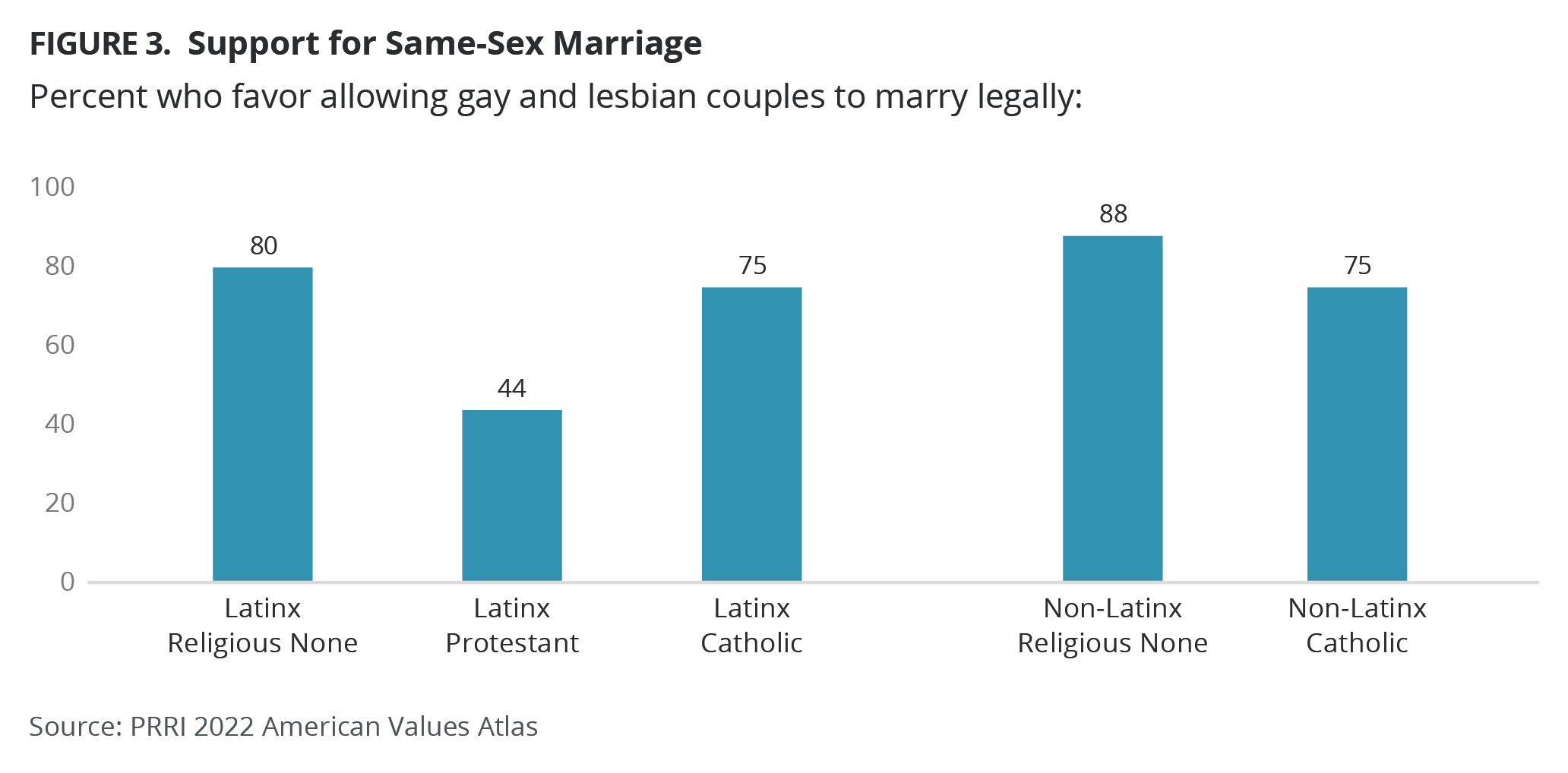
Interestingly, when examining opposition towards allowing small business owners to refuse service to LGBTQ customers based on religious convictions the story more closely mimics the patterns of partisanship described earlier. There is little daylight in the AVA between the attitudes of Latinx and non-Latinx Religious Nones, who oppose such a provision by 75% and 76% respectively. While opposition for this position decreases to 63% among Latinx Protestants, it slightly increases to 78% among Latinx Catholics. For this issue, Latinx Catholics appear far more in line with the Democratic Party’s position compared with the 64% of their non-Latinx Catholic counterparts who oppose this exemption.
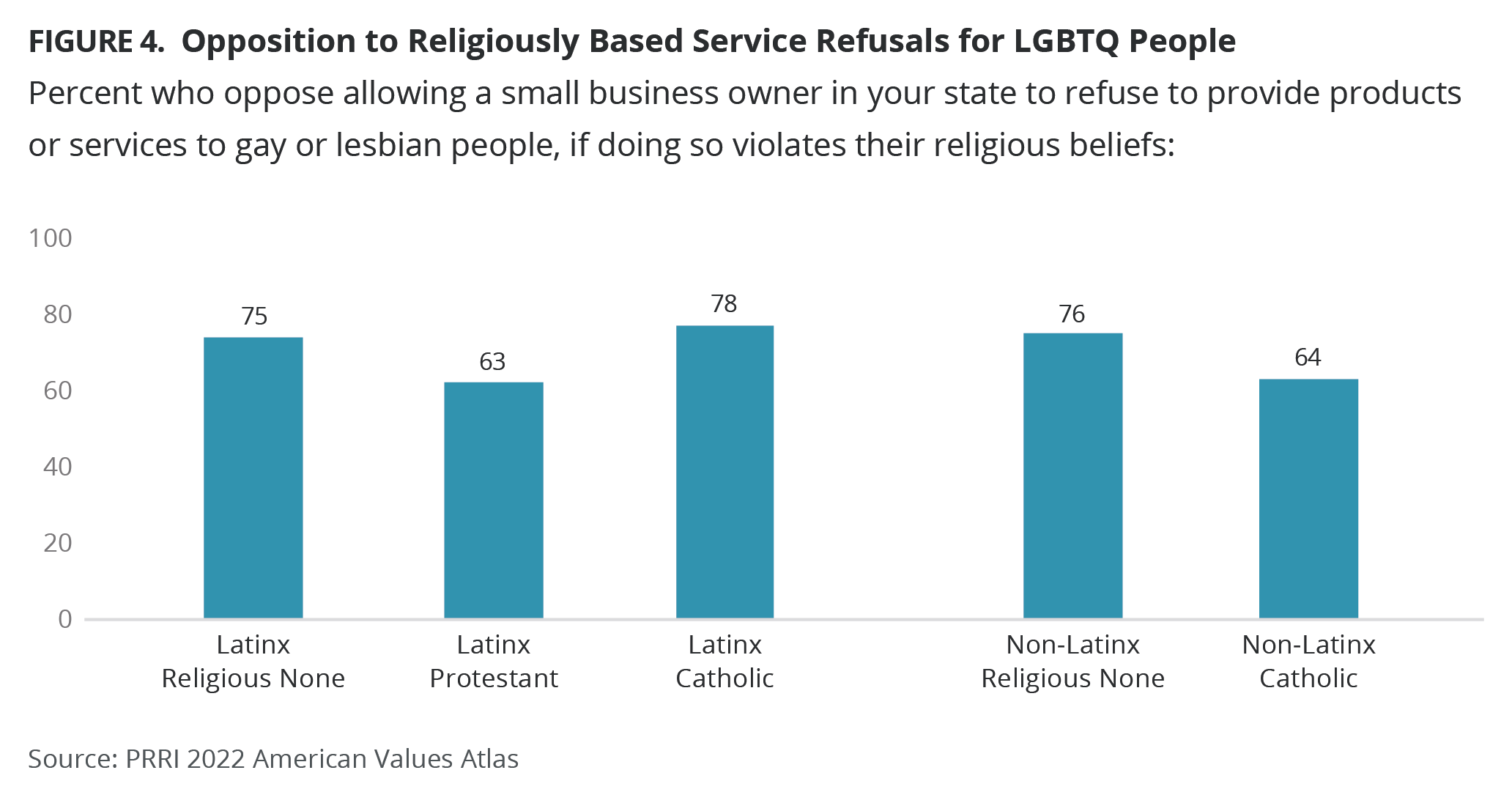
President Trump’s ban on transgender people serving in the military represented a new front in the culture wars. Despite legal challenges and a policy modification to allow current members of the military to continue to serve, the ban took effect in 2019 and had a dramatic impact on policy attitudes in the CCES. Figure 5 illustrates that support for the ban increased from 2018 to 2019 by 8-9 percentage points in each of the Latinx religious subgroups with substantively smaller gains among their non-Latinx counterparts. Although support for this ban increased to 32% among Latinx Catholics in 2020, support declined 5 percentage points (to 22%) among Religious Nones and by 10 percentage points for Protestants (to 43%). The latter is a particularly troubling sign for Republicans as they continue to promote increasingly restrictive policy towards the transgender community in a variety of areas.
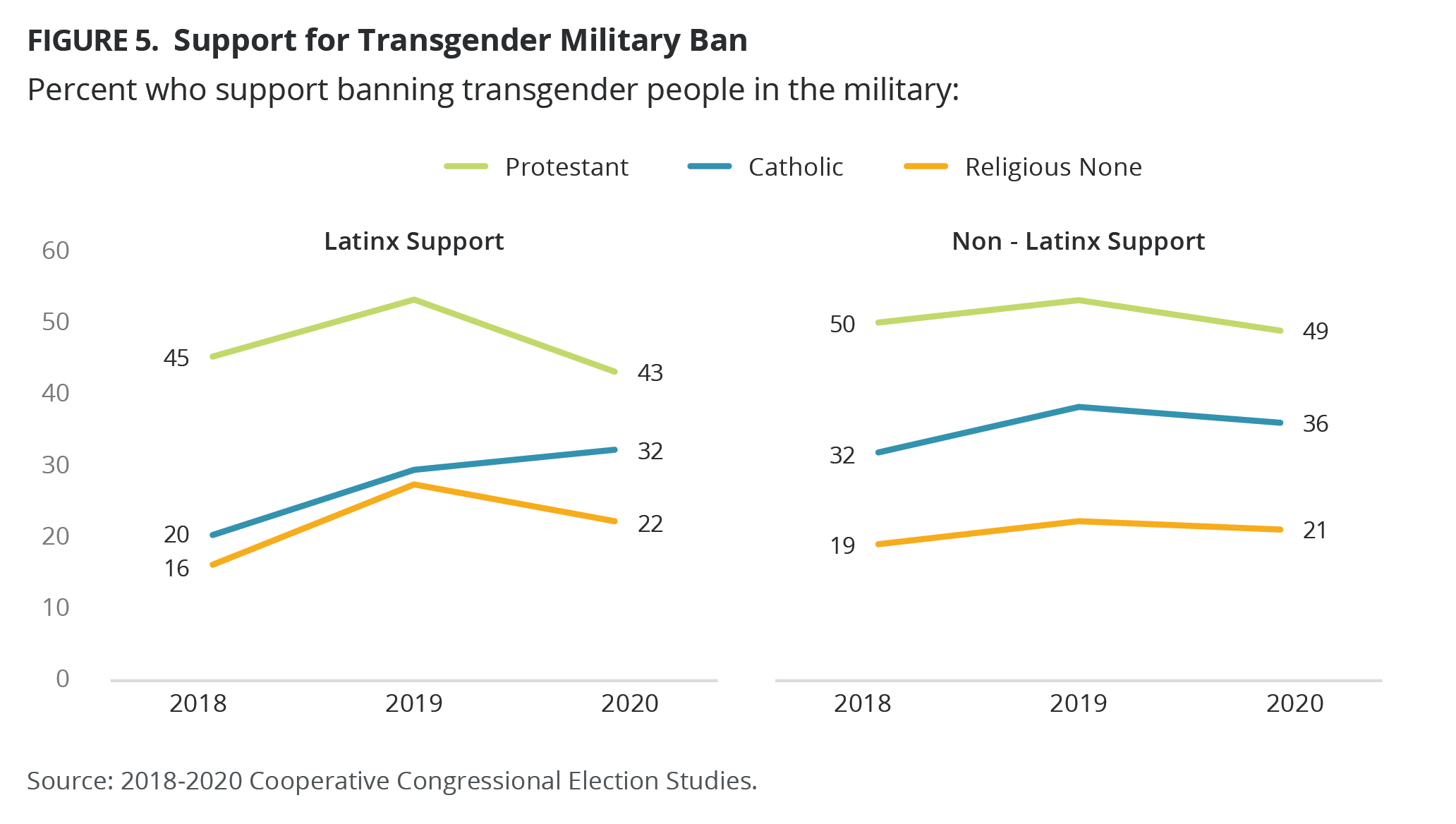
The differences highlighted here illustrate the dangers that both Democrats and Republicans face in ignoring the varied ways in which Latinx people from different religious traditions feel about these culture war issues compared with each other and their non-Latinx counterparts. On the whole, Latinx were roughly 15 percentage points more supportive of banning abortion in all or most cases, but also 4 percentage points less supportive of a ban on transgender military service. However, these broad generalizations mask important subgroup differences and counterintuitive trends. While culture war issues are only one part of the political puzzle in cobbling together an electoral coalition, parties and politicians who assume homogeneity risk overconfidence and missed opportunities. Exit polls from the 2022 midterm election estimate that Latinx support for the Democratic Party stood at 60%; continuing its slow but steady erosion in recent years. If Democratic candidates hope to regain their dominance — and Republicans hope to build on their success — it is important for both to court Latinx voters not as a unified bloc, but rather as the diverse tapestry that they are. Success for either party requires acknowledging this reality and working to build coalitions with various subgroups who share each party’s political vision.
[1]The Protestant category includes those who indicated that they were evangelical or born-again Christians.





